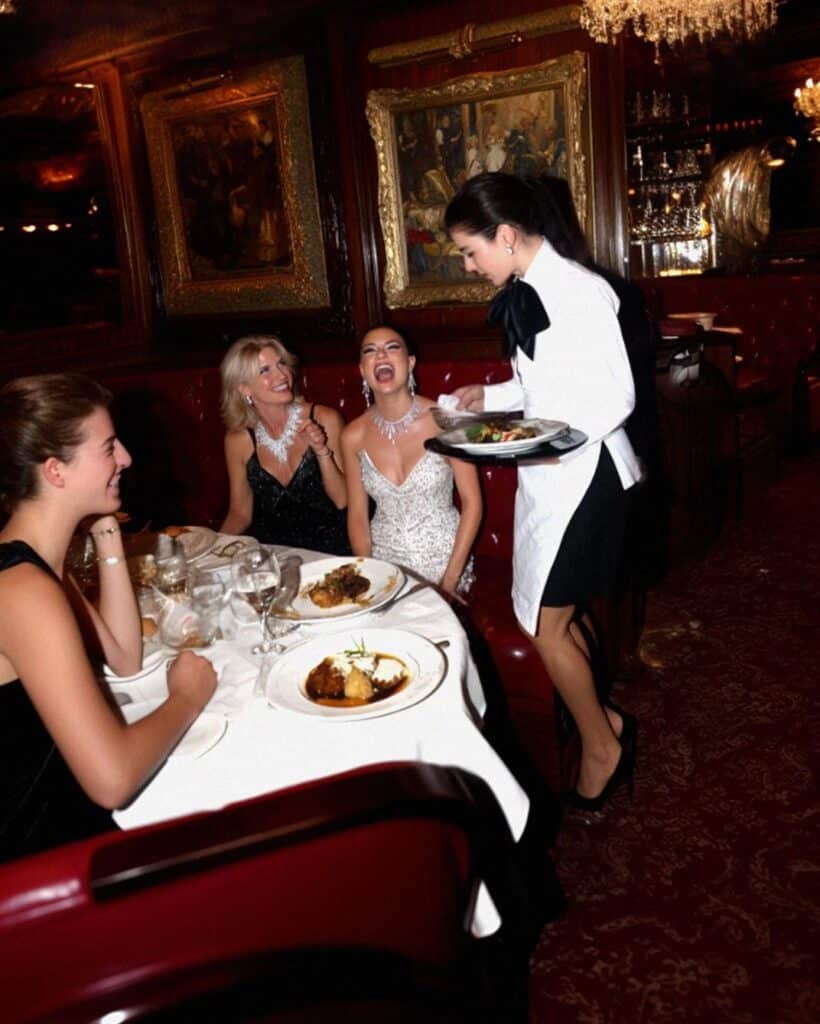Jack and I had only been seeing each other for three months when he told me to dress up and meet him downtown. He’d snagged a reservation at one of those places with linen-draped tables, hushed lighting, and a waitlist that stretches into next season. It felt like a milestone—not just a nice dinner, but a little door we were walking through together.
By dessert we were relaxed and silly, sharing a chocolate torte and trading bites like kids. That’s when the temperature in the room seemed to drop. At a table a few feet away, three women in head-to-toe designer—diamond bracelets winking like they were alive—were holding court. They had the kind of laughter that demands an audience.
Our waitress approached them balancing three plates, and the one in the middle, all glitter and gloss, scrunched her nose so dramatically I thought she might sneeze. “Do you smell that?” she said, loud enough to carry. “She smells… poor. Like a bus seat.”
Her friend swirled her wine and smirked. “Forget the smell. Look at those shoes. How do you work in a place like this with scuffs like that?”
The third leaned in, delighted with herself. “Maybe tips are her whole salary. Maybe she eats leftover bread in the kitchen.”
They covered their mouths as they laughed, but not to be polite—just to savor it.
Our waitress went rigid. She couldn’t have been more than twenty. Her hands trembled as she set down each plate with surgical care, cheeks burning under the chandelier light. She looked like she wanted to apologize for existing, then thought better of it and swallowed whatever she’d been about to say.
All around the room, silverware suddenly became fascinating. No one looked up. I felt heat climb my neck, my fork clatter to the plate.
Then Jack pushed his chair back. The scrape of wood on marble snapped the air.
He didn’t stride, he didn’t bluster. He just walked over—calm, steady—and stopped at the corner of their table. “Excuse me,” he said, voice even but carrying, “do you hear yourselves? She’s working. You don’t look important when you mock someone who can’t answer back. You just look small.”
The woman in diamonds blinked. Her mouth opened, then shut again. The smirks at her flanks slid away like condensation on glass.
Our waitress breathed out a shaky “thank you,” barely louder than a whisper.
It was like a spell broke. A couple at the next table began to clap. Then the couple beyond them. In seconds it rolled across the room—hands meeting in a wave of sound that said we heard, we saw, we agreed.
The manager appeared, drawn like metal to a magnet. Jack stepped aside and explained in a few low words. The manager turned to the women with a professionalism that had edges. “Ladies, I’m going to have to ask you to leave.”
Diamonds stiffened. “Do you know who—”
“Yes,” he said gently. “I know our standards.”
They gathered their bags with small, angry clicks, heels ticking across the floor as they left. The room settled, but warmer now, like a storm had moved through and taken the static with it.
Jack came back to our table and sat, as if he’d only gotten up to stretch. Then he stood again and went to find our waitress. He didn’t look triumphant. Just focused, like there was a mess to tidy and he was the sort of person who did that.
When he returned, he slid into his chair and picked up his fork like nothing at all had happened. “She’s okay,” he said. “Took a break.”
My chest loosened. “You didn’t have to do that.”
He gave a little half-shrug. “Then who would?”
Later, when the check came, the manager comped dessert and apologized for the scene. Our waitress reappeared with eyes a little puffy but chin higher than before. Jack thanked her for the service like it was an ordinary night. She squeezed the check presenter with both hands before walking away.
On the sidewalk, the city air felt cleaner. We stood under the glow of the sign and watched taxis blink past, and I realized I’d just learned something important about the man beside me. Not that he was brave—I knew that. Not that he was kind—I’d suspected that, too. But that he was the sort of person who would stand up in a quiet room and choose dignity over comfort, even when no one else did.
It wasn’t a grand speech or a perfect clapback that made the difference. It was the simple insistence that respect belongs to everyone—and the willingness to say so out loud.
I went into dinner with a boyfriend I really liked. I left with the certainty that I was with someone who makes sure kindness gets the last word.
